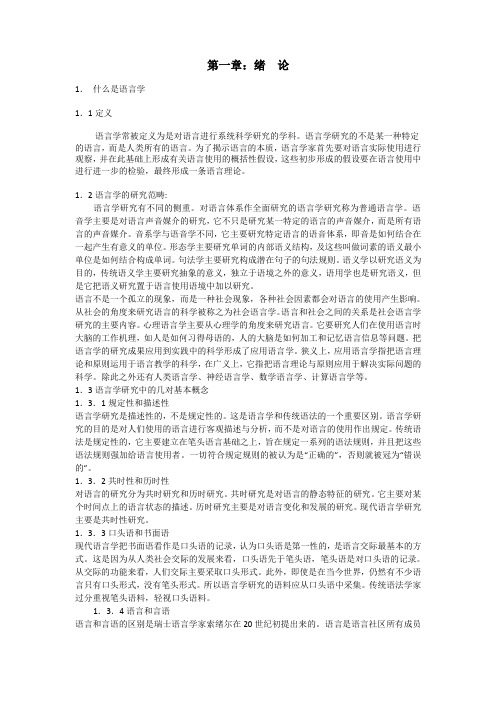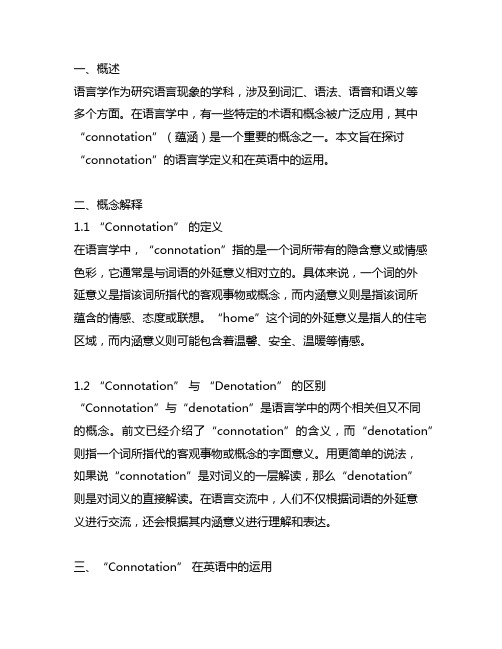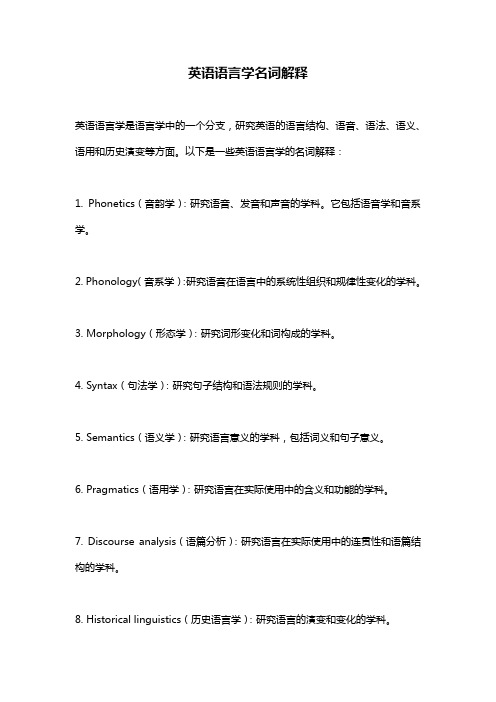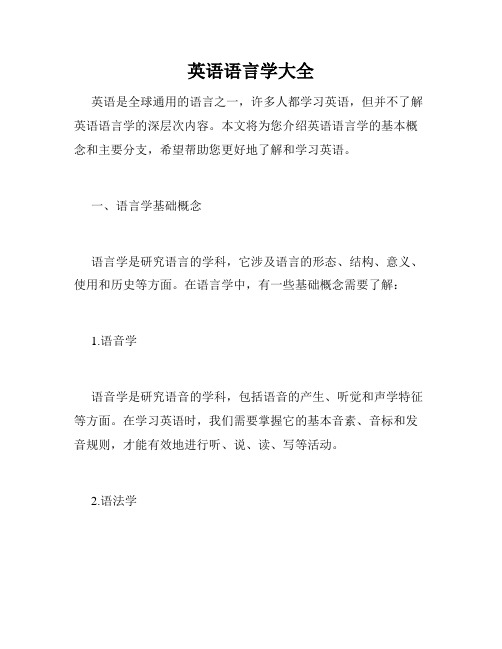英语语言学中的一些基本定义
英语语言学第一章、第二章

第一章:绪论1.什么是语言学1.1定义语言学常被定义为是对语言进行系统科学研究的学科。
语言学研究的不是某一种特定的语言,而是人类所有的语言。
为了揭示语言的本质,语言学家首先要对语言实际使用进行观察,并在此基础上形成有关语言使用的概括性假设,这些初步形成的假设要在语言使用中进行进一步的检验,最终形成一条语言理论。
1.2语言学的研究范畴:语言学研究有不同的侧重。
对语言体系作全面研究的语言学研究称为普通语言学。
语音学主要是对语言声音媒介的研究,它不只是研究某一特定的语言的声音媒介,而是所有语言的声音媒介。
音系学与语音学不同,它主要研究特定语言的语音体系,即音是如何结合在一起产生有意义的单位。
形态学主要研究单词的内部语义结构,及这些叫做词素的语义最小单位是如何结合构成单词。
句法学主要研究构成潜在句子的句法规则。
语义学以研究语义为目的,传统语义学主要研究抽象的意义,独立于语境之外的意义,语用学也是研究语义,但是它把语义研究置于语言使用语境中加以研究。
语言不是一个孤立的现象,而是一种社会现象,各种社会因素都会对语言的使用产生影响。
从社会的角度来研究语言的科学被称之为社会语言学。
语言和社会之间的关系是社会语言学研究的主要内容。
心理语言学主要从心理学的角度来研究语言。
它要研究人们在使用语言时大脑的工作机理,如人是如何习得母语的,人的大脑是如何加工和记忆语言信息等问题。
把语言学的研究成果应用到实践中的科学形成了应用语言学。
狭义上,应用语言学指把语言理论和原则运用于语言教学的科学,在广义上,它指把语言理论与原则应用于解决实际问题的科学。
除此之外还有人类语言学、神经语言学、数学语言学、计算语言学等。
1.3语言学研究中的几对基本概念1.3.1规定性和描述性语言学研究是描述性的,不是规定性的。
这是语言学和传统语法的一个重要区别。
语言学研究的目的是对人们使用的语言进行客观描述与分析,而不是对语言的使用作出规定。
传统语法是规定性的,它主要建立在笔头语言基础之上,旨在规定一系列的语法规则,并且把这些语法规则强加给语言使用者。
英语语言学-框架知识-中文版

一、绪论语言学的定义语言学的研究范畴几对基本概念语言的定义语言的甄别特征What is linguistics? 什么是语言学?Linguistics is generally defined as the scientific study of language. It studies not any particular language, but languages in general. 语言学是对语言科学地进行研究的学科。
语言学所要研究的不是某一种特定的语言,而是人类所有语言的特性。
The scope of linguistics 语言学研究的范畴Phonetics语音学\Phonology音系学\Morphology形态学\Syntax句法学\Semantics语义学\Pragmatics语用学\Sociolinguistics社会语言学\Psycholinguistics心理语言学\Applied linguistics应用语言学Prescriptive vs. descriptive 规定性与描述性Descriptive:a linguistic study describes and analyzes the language people actually use.Prescriptive: it aims lay down rules for "correct" behavior.Modern linguistics is descriptive; its investigations are based on authentic, and mainly spoken data.Traditional grammar is prescriptive; it is based on "high" written languageSynchronic vs. diachronic 共时性与历史性The description of a language at some point in time is a synchronic studyThe description of a language as it changes through time is a diachronic studyIn modern linguistics, synchronic study seems to enjoy priority over diachronic study.Speech and writing 口头语与书面语Speech enjoys priority over writing in modern linguistics study for the following reasons: (1) speech precedes writing in terms of evolution(2) a large amount of communication is carried out in speech tan in writing(3) speech is the form in which infants acquire their native languageLanguage and parole 语言与言语Language refers to the abstract linguistic system shared by all the members of a speech communityParole refers to the realization of language in actual useCompetence and performance 能力与运用Chomsky defines competence as the ideal users' knowledge of the rules of his language Performance: the actual realization of this knowledge in linguistic communicationWhat is language? 什么是语言?Language is a system of arbitrary vocal symbols used for human communicationCharacteristics of language: 语言的特性Language is a rule-governed systemLanguage is basically vocalLanguage is arbitrary (the fact different languages have different words for the sameobject is a good illustration of the arbitrary nature of language. This conventional nature of language is well illustrated by a famous quotation from Shakespeare's play "Romeo and Juliet": "A rose by any other name would smell as sweet.")Language is used for human communicationDesign features of language 语言的甄别特征American linguist Charles Hockett specified 12 design features:1) arbitrariness 武断性2) productivity 创造性3) duality 二重性4) displacement移位性5) cultural transmission 文化传递性二、音系学语言的声音媒介什么是语音学发音器官音标……宽式和严式标音法英语语音的分类音系学和语音学语音、音位、音位变体音位对立、互补分部、最小对立几条音系规则超切分特征Two major media of communication: speech and writingThe limited range of sounds which are meaningful in human communication and are of interest to linguistic studies are the phonic medium of language. 用于人类语言交际的声音称为语音,这些数目有限的一组语音构成了语言的声音媒介。
(827)英语语言学知识

英语语言学是研究英语语言的科学领域,它涵盖了英语的语音、语法、词汇、句法、语义以及语用等方面的研究。
本文将从不同角度介绍英语语言学的基本概念、研究方法以及一些相关的重要理论。
一、语音学语音学是研究语音的科学,它关注的是语音的产生、传播和感知。
在英语语言学中,我们需要了解英语的音素和音系,即英语中的音位和音位之间的关系。
此外,我们还需要了解如何正确地发音,包括英语的元音和辅音。
二、语法学语法学是研究语言的结构和规则的科学,它关注的是语言中单词和句子的组成以及它们之间的关系。
在英语语言学中,我们需要了解英语的基本句型和句子成分的分类。
同时,我们还需要学习英语的时态、语态和语气等语法现象。
三、词汇学词汇学是研究词汇的科学,它关注的是词汇在语言中的作用和使用。
在英语语言学中,我们需要了解英语的词汇分类和词义的多样性。
同时,我们还需要学习如何正确地使用英语词汇,包括词汇的拼写和用法。
四、句法学句法学是研究句子结构和句子成分的科学,它关注的是句子的组成和句子成分之间的关系。
在英语语言学中,我们需要了解英语句子的基本结构和句子成分的分类。
同时,我们还需要学习如何正确地构造和分析英语句子。
五、语义学语义学是研究语言意义的科学,它关注的是语言中词汇和句子的意义。
在英语语言学中,我们需要了解词汇的意义和句子的意义,包括词语之间的关联和句子的推理。
同时,我们还需要学习如何正确地理解和表达英语的语义内容。
六、语用学语用学是研究语言使用的科学,它关注的是语言在社交交际中的实际运用。
在英语语言学中,我们需要了解英语的语用规则和语用策略,包括言语行为和话语的意图。
同时,我们还需要学习如何在不同语境下使用英语,以达到有效交流的目的。
《(827)英语语言学知识》是一篇关于英语语言学基本概念、研究方法和相关理论的文档。
通过学习语音学、语法学、词汇学、句法学、语义学和语用学等方面的知识,我们可以更好地理解和运用英语语言。
希望本文能够帮助读者对英语语言学有更深入的了解和认识。
英语语言学知识整理1

Chapter 1 Introduction语言学的定义:Linguistics is generally defined as the scientific study of language.问题:How do you interpret the following definition of linguistics: Linguistics is the scientific study of language?→It is a scientific study because it is based on the systematic investigation of linguistic data, conducted with reference to some general theory of language structure.What the linguist has to do “first, then, but”:①to observe and collect language facts and generalizations are made about them.②to formulate some hypotheses about the language structure.③to check the hypotheses thus formed repeatedly against the observed facts to fully prove their validity.The study of language as a whole is often called general linguistics. (普通语言学)问题: What are the major branches of linguistics? What does each of them study?→phonetics(语音学)→the study of sounds→phonology(音位学)→study how sounds are put together and used to convey meaning→morphology(形态学)→study the way in which symbols or morphemes are arranged and combined to form words.→syntax(句法学)→the study of rules of forming sentences →semantics(语义学)→the study of meaning→pragmatics(语用学)→ the context of language use Sociolinguistics(社会语言学):The studies of all these social aspects of language and its relation with society form the core of the branch.Psycholinguistics(语言心理学):Relate the study of language to psychologyApplied linguistics(应用语言学):In a narrow sense it refers to the application of linguistic theories and principles to language teaching, especially the teaching of foreign and second languages.Some important distinctions in linguistics:①prescriptive(规定性)/descriptive(描写性)②synchronic(共时)/diachronic(历时)③speech(口语)/writing(书面语)④langue(语言)/parole(言语)(the Swiss linguist F. de Saussure ——Course in General Linguistics)⑤competence(语言能力)/performance(语言应用)(the American linguist N. Chomsky)⑥traditional grammar (传统语法)/modern linguistics(现代语言学)问题:in what basic ways does modern linguistics differ from traditional grammar?①linguistics is descriptive while traditional grammar is prescriptive.②modern linguistics regards the spoken language as primary, not the written.③modern linguistics does not force languages into a Latin-based framework.问题:Is modern linguistics mainly synchronic or diachronic? Why?In modern linguistics, a synchronic (不考虑历史演进的, 限于一时的) approach seems to enjoy priority over a diachronic (探求现象变化的, 历时的) one.Because it is believed that unless the various states of a language in different historical periods are successfully studied, it would be difficult to describe the changes that have taken place in its historical development.Synchronic descriptions are often thought of as being descriptions of language in its current existence, and most linguistic studies are of this type.问题:For what reasons does modern linguistics give priority to speech rather than to writing?From the point of view of linguistic evolution, speech is prior to writing. The writing system of any language is always “invented”by its users to record speech when the need arises. Even in today’s world there are still many languages that can only be spoken but not written. Then in everyday communication, speech plays a greater role than writing in terms of the amount of information conveyed.Spoken language reveals more true features of human speech while written language is only the “revised”record of speech. And linguists’data for investigation and analysis are mostly drawn from everyday speech, which they regarded as authentic.语言的定义:Language is a system of arbitrary vocal symbols used for human communication.Design features of language(7个识别特征)①arbitrariness 任意性(at the syntactic level)②productivity 能产性,创造性Secondary units(底层结构 sounds)③duality 双层性Primary units (上层结构 units of meaning)④displacement 不受时空限制性(handle generalization and abstraction)⑤cultural transmission 文化传递性⑥interchangeability 互换性⑦convention 约定性Functions of language:三大主要功能:The descriptive functionThe expressive functionThe social functionRoman Jacobson(6种首要因素,结构主义语言学家)①speaker addresser→emotive 感情功能②addressee→conative 意动功能③context→referential所指功能④message→poetic 诗学功能⑤contact→phatic communion交感功能⑥code→metalinguistic 元语言功能Other functions:①phatic function 问候功能②informative f. 信息功能③interrogative f. 询问功能④expressive f. 表达功能⑤evocative f. 感染功能⑥directive f. 指令功能⑦performative f. 行使(权力)功能M.A.K. Halliday①ideational②interpersonal(indicate/establish/maintain/social relationships)③textual问题:How is Saussure’s distinction between langue and parole similar to Chomsky’s distinction between competence and performance?The distinction between langue and parole was made by Saussure, langue is abstract; it is not the language people actually use. Parole is concrete; it refers to the naturally occurring language events. Langue is relatively stable; it does not change frequently, while parole varies from people to people, and from situation to situation.The distinction between competence and performance proposed by the American linguists Chomsky, competence is a deal user’s knowledge of the rules of his language, and the performance is the actual realization of this knowledge in linguisticcommunication. Imperfect performance is caused by social and psychological factors.Saussure makes this distinction in order to single out one aspect of language for serious study. In his opinion, parole is simple a mass of linguistic facts, too varied confusing for systematic investigation, and that linguistics should do is to abstract langue from parole, i.e., to discover the regularities governing the actual use of language and make them the subjects of study of linguistics.Similar to Saussure, Chomsky thinks what linguists should study is the ideal speaker’s competence, not his performance, which is too haphazard to be studied.问题:What are the main features of human language that have been specified by C. Hockett to show that it is essentially different from animal communication system?①arbitrariness 任意性(at the syntactic level)②productivity 能产性,创造性Secondary units(底层结构 sounds)③duality 双层性Primary units (上层结构 units of meaning)④displacement 不受时空限制性(handle generalization andabstraction)⑤cultural transmission 文化传递性⑥interchangeability 互换性⑦convention 约定性Chapter 2 PhonologyPhonetics: (语音学)①the study of the phonic medium of language②look at speech sounds from 3 distinct but related points of view.Ⅰstudy the sounds from the speaker’s point of view→articulatory phonetics(发音语音学)Ⅱlook at the sounds from the hearer’s point of view→auditory phonetics(听觉语音学)Ⅲstudy the way sounds travel by looking at the sound waves →acoustic phonetics(声学语音学)③study how sounds are produced, transmitted and perceived. Organs of speech:⒈three important areas①The pharyngeal cavity→the throat② the oral cavity→the mouth③ the nasal cavity→the nose⒉The pharyngeal cavity→windpipe/glottis/larynx/vocalcords⒊the oral cavity→tongue/uvula/soft palate(velum)/hard palate/teeth ridge(alveolus)/teeth/lipsInternational Phonetic Alphabet (IPA)①diacritics 附加符号②broad transcription(宽式标音)→the transcription with letter-symbols only③narrow transcription(严式标音)→the transcription withletter-symbols together withthe diacriticsClassification of English speech sounds①two broad categories of speech sounds in English: Vowels/consonants②two ways to classify the English consonants: In terms ofmanner ofarticulationIn terms of place of articulation③In terms of manner of articulation:Stops/fricatives/affricates/liquids/nasals/glides④In terms of place of articulation:Bilabial/labiodental/dental/alveolar/palatal/velar/glottal⑤Classification of English vowels⒈criteria :(monophthongs)单元音The position of the tongue in the mouth: front/central/back The openness of the mouth: close vowels/semi-closevowels/semi-openvowels/open vowels The shape of the lips: unrounded/roundedThe length of the vowels: tense/lax⒉diphthongs 双元音/ ei // ai // au // əu // ɔi // iə //εə// uə /Phonology 音韵学,语音体系Difference of phonology and phonetics:①Phonetics is interested in all the speech sounds used in allhuman languages.②Phonology aims to discover how speech sounds in a languageform patterns and how these sounds are used to convey meaning in linguistic communication.Phone(音素): A phone is a phonetic unit or segment. Phoneme(音位): It is a phonological unit; it is a unit that is of distinctive value. It is an abstract unit. It is not any particular sound, but rather it is represented or realized by a certain phone in a certain phonetic context.Allophone(音位变体): The different phones which can represent a phoneme in different phonetic environments are called the allophones of that phoneme.Phonemic contrast(音位对立)Complementary distribution(音位变体的互补分布)Minimal pairs(最小对立体):含音位的单词的全部音标Minimal set(最小对立集):is used to find the important sounds in language.Phonological Analysis(音位分析)Principle: certain sounds cause changes in the meaning of a word or phase, whereas other sounds do not.Phonetically similar sounds:描述音位关系Free variants: 音位的自由变体The difference of pronouncing a sound caused by dialect, habit, individual difference or regional differences instead of by any distribution rule.Some rules in phonology①sequential rules: 序列规则If a word begins with a / l / or a / r /, then the next sound must be a vowel.If three consonants should cluster together at the beginning of a word, the combination should obey the following three rules:The first phoneme must be / s /The second phoneme must be / p / / t / / k /The third phoneme must be / l // r // w /②assimilation rule:同化规则③deletion rule:省略规则Suprasegmental features 超音段特征≠超音段(比音位更大的语言单位)①stress(单词,句子层面):the location of stress in English distinguishes meaning.Syllable音节:A syllable nucleus (often a vowel) with optional initial and final margins (often consonants)单音节词多音节词英语单词都有重读音位学中,单词由音节构成,音节由音位构成。
connotation语言学定义英语

一、概述语言学作为研究语言现象的学科,涉及到词汇、语法、语音和语义等多个方面。
在语言学中,有一些特定的术语和概念被广泛应用,其中“connotation”(蕴涵)是一个重要的概念之一。
本文旨在探讨“connotation”的语言学定义和在英语中的运用。
二、概念解释1.1 “Connotation” 的定义在语言学中,“connotation”指的是一个词所带有的隐含意义或情感色彩,它通常是与词语的外延意义相对立的。
具体来说,一个词的外延意义是指该词所指代的客观事物或概念,而内涵意义则是指该词所蕴含的情感、态度或联想。
“home”这个词的外延意义是指人的住宅区域,而内涵意义则可能包含着温馨、安全、温暖等情感。
1.2 “Connotation” 与“Denotation” 的区别“Connotation”与“denotation”是语言学中的两个相关但又不同的概念。
前文已经介绍了“connotation”的含义,而“denotation”则指一个词所指代的客观事物或概念的字面意义。
用更简单的说法,如果说“connotation”是对词义的一层解读,那么“denotation”则是对词义的直接解读。
在语言交流中,人们不仅根据词语的外延意义进行交流,还会根据其内涵意义进行理解和表达。
三、“Connotation” 在英语中的运用2.1 词语的积极与消极内涵英语中的许多词语都具有明显的积极或消极内涵,这些内涵往往是由文化、历史和社会因素所决定的。
“freedom”(自由)一词具有积极的内涵,常用于表达人们追求自由和民主的渴望;而“violence”(暴力)一词则具有消极的内涵,常用于描述恐怖活动和侵犯行为。
在英语交流中,正确理解词语的内涵对于准确表达和避免误解十分重要。
2.2 文学作品中的应用在文学作品中,“connotation”常常被运用以营造特定的情感氛围和刻画人物形象。
作家通过选择具有特定内涵的词语来描绘环境和人物,进而引发读者的情感共鸣。
专八语言学知识要点

第三章英语语言学第一节语言学基本概念知识点较多,但是多集中于基本概念和运用,不需要深入挖掘,记住基本概念即可。
1 语言的特点和功能特点:Creativity 可创造性Duality 两重性(声音和意义)Arbitrariness 任意性Displacement 移位性Cultural Transmission 文化传递性Interchangeabilty 可交换性Reflexivity 自反性人类的语言可以描述语言本身功能:Informative 信息功能(功能语言学中称之为ideational function)Interpersonal 人际功能通过语言来建立社会联系Performative 施为功能通过语言来完成任务,来自于语用学Emotive 感情功能可以改变听者的感情Phatic Communion 交感功能特定的表达方式来维护关系,例如打招呼Recreational 娱乐功能,例如唱歌Metalingual 元语言功能可以用语言来谈论语言本身2 语言学的主要分支内部分支:Phonetics 语音学Articulatory Phonetics 发音语音学语音产生Acoustic Phonetics 声学语音学研究物理特性Auditory Phonetics 听觉语音学发音的潜在机制Consonants / VowelsPhonology 音系学研究语音和音节结构分布和排列Phone 音素语言的一个单元或是音段Phoneme 音位在语言中具有区别意义的最小的语言单位Allophones 音位变体put spanContrastive Distribution 对立分析能够找到的最小的语音对bear pearComplementary Distribution 互补分析从不在相同环境出现的音位变体peak speakFree Variation 自由变体同一个词由于某个原因发了两个音,这种差异可能来源于方言或是习惯increaseSuprasegemental Features 超音段特征(音节、重音、音调、语调)Morphology 形态学研究英语中最小单位——语素和成词过程,即单词的内部构造Morpheme 词素最小的有意义的语言单位Free Morpheme 自由语素(有自己构成英语单词的称为此,是单词root/stem)和BoundMorpheme 粘连语素(需要和自由语素联合构成单词的称为此,是词缀,进一步分为Inflectional Affixes 屈折词缀,在现代英语中主要指单复数,时态比较级等等和Derivational Affixes 派生词缀,这是形成新词的关键)。
英语语言学名词解释

英语语言学名词解释
英语语言学是语言学中的一个分支,研究英语的语言结构、语音、语法、语义、语用和历史演变等方面。
以下是一些英语语言学的名词解释:
1. Phonetics(音韵学):研究语音、发音和声音的学科。
它包括语音学和音系学。
2. Phonology(音系学):研究语音在语言中的系统性组织和规律性变化的学科。
3. Morphology(形态学):研究词形变化和词构成的学科。
4. Syntax(句法学):研究句子结构和语法规则的学科。
5. Semantics(语义学):研究语言意义的学科,包括词义和句子意义。
6. Pragmatics(语用学):研究语言在实际使用中的含义和功能的学科。
7. Discourse analysis(语篇分析):研究语言在实际使用中的连贯性和语篇结构的学科。
8. Historical linguistics(历史语言学):研究语言的演变和变化的学科。
9. Sociolinguistics(社会语言学):研究语言和社会、文化、地理和历史等因素之间的关系的学科。
10. Psycholinguistics(心理语言学):研究语言和心理过程之间的关系的学科,包括语言习得、记忆和理解等。
以上是一些常见的英语语言学名词解释,它们涵盖了英语语言学的主要领域和分支。
英语语言学大全

英语语言学大全英语是全球通用的语言之一,许多人都学习英语,但并不了解英语语言学的深层次内容。
本文将为您介绍英语语言学的基本概念和主要分支,希望帮助您更好地了解和学习英语。
一、语言学基础概念语言学是研究语言的学科,它涉及语言的形态、结构、意义、使用和历史等方面。
在语言学中,有一些基础概念需要了解:1.语音学语音学是研究语音的学科,包括语音的产生、听觉和声学特征等方面。
在学习英语时,我们需要掌握它的基本音素、音标和发音规则,才能有效地进行听、说、读、写等活动。
2.语法学语法学是研究语言结构和组织的学科,有时也称为句法学。
它研究语言的词类、句子结构、语法关系等方面。
通过学习英语的语法,我们可以正确使用语言,避免出现语法错误。
3.语义学语义学是研究语言意义的学科,它探究词汇、短语和句子意义的形成和变化。
在英语学习中,我们需要理解单词和短语的意义,以及句子的含义,以便正确理解和表达内容。
4.语用学语用学是研究语言使用的学科,包括口语和书面语言的使用场合、对话方式、说话人的语言目标和对听者的影响等方面。
在英语学习中,我们需要了解不同场合和对象的语言使用规范,以便与人交流时更加得心应手。
二、英语语言学的主要分支除了以上基础概念外,英语语言学还有一些重要的学术分支,能够帮助我们更深入地了解和掌握英语。
1.语音学英语语音学探究的是英语中的音素、音标和发音规则等方面,以及与其他语音系统的比较和差异。
2.语法学英语语法学研究的是英语的句法结构、语法关系和句子意义等方面,以及与其他语言的比较和翻译问题。
3.词汇学英语词汇学是研究英语词汇的学科,包括单词的来源、组成和意义等方面,以及与其他语言的比较和词汇翻译问题。
4.语用学英语语用学研究的是英语在语言使用中的实际应用,包括语言交际、言语行为、语境和语言目的等方面。
5.文本语言学英语文本语言学是研究英语文本的结构、组织和语言特点等方面的学科,包括语篇分析和修辞分析等内容。
- 1、下载文档前请自行甄别文档内容的完整性,平台不提供额外的编辑、内容补充、找答案等附加服务。
- 2、"仅部分预览"的文档,不可在线预览部分如存在完整性等问题,可反馈申请退款(可完整预览的文档不适用该条件!)。
- 3、如文档侵犯您的权益,请联系客服反馈,我们会尽快为您处理(人工客服工作时间:9:00-18:30)。
定义 1.语言学Linguistics is generally defined as the scientific study of language.2.语言Language is a system of arbitrary vocal symbols used for human communication.语言是人类用来交际的任意性的有声符号体系。
4.识别特征Design Features It refers to the defining poperties of human language that distinguish it from any animal system of communication.语言识别特征是指人类语言区别与其他任何动物的交际体系的限定性特征。
Arbitrariness任意性Productivity多产性Duality双重性Displacement移位性Cultural transmission文化传递⑴arbitrariness There is no logical connection between meanings and sounds.P.S thearbitrary nature of language is a sign of sophistication and it makes it possible for language to have an unlimited source of expressions⑵Productivity Animals are quite limited in the messages they are able to send.⑶Duality Language is a system,which consists of two sets of structures,or two levels.⑷Displacement Language can be used to refer to contexts removed from the immediate situations of the speaker.⑸Cultural transmission Human capacity for language has a genetic basis,but we have to be taught and learned the details of any language system.this showed that language is culturally transmitted.not by instinct.animals are born with the capacity to produce the set of calls peculiar to their species.5.语言能力Competence is the ideal user’s knowledge of the rules of his language.6.语言运用Performance is the actual realization of this knowledge in linguistic communication.语言运用是所掌握的规则在语言交际中的体现。
7.历时语言学Diachronic linguistics The study of language change through time.a diachronic study of language is a historical study,which studies thehistorical development of language over a period of time.8.共时语言学Synchronical linguistics The study of a given language at a given time.9.语言langue The abstract linguistic system shared by all members of a speech community.10.言语parole The realization of langue in actual use.11.规定性Prescriptive It aims to lay down rules for”correct”behavior,to tell people what they should say and what should not say.12.描述性Descriptive A linguistic study describes and analyzes the language people actually use.三、问答题 1.what are major branches of linguistics?what does each study? Phonetics----it’s defined as the study of the phonic medium of language,it’s concerned with all the sounds that occur in the world’s languages. Phonology---the study of sounds systems—the inventory of distinctive sounds that occur in a language and the patterns into which they fall. Morphology---It’s a branch of a grammar which studies the internal structure of words and the rules by which words are formed.Syntax-------it's a subfield of linguistics that studies the sentence structure of a language. Semantics---It’s simply defined as the study of meaning in abstraction. Pragmatics---the study of meaning in context of words. Sociolinguistics—the study of language with reference to society. Psycholinguistics---the study of language with reference to the working of the mind.Applied linguistics---the application of linguistic principles and theories to language teaching and learning.2.why do we say language is arbitrary?Language is arbitrary in the sense that there is no intrinsic connection between the sounds that people use and the objects to which these sounds refer.The fact that different languages have different words for the same object is a good illustration of the arbitrary nature of language,it’s only our tacit agreement of utterance and concept at work and not any innate relationship bound up in the utterance.A typical example to illustrate the‘arbitrariness’of language is‘a rose by any other name would smell as sweet’.6.the distinction between langue and parole?⑴langue is abstract,relatively stable⑵parole is concrete,varies from person to person,from situation to situation.1/What is linguistics?什么是语言学?Linguistics is generally defined asthe scientific study of language.It studies not any particular language,but languages in general.2/The scope of linguistics语言学的研究范畴The study of language as a whole is often called general linguistics.(普通语言学)The study of sounds, which are used in linguistic communication,is called phonetics.(语音学)The study of how sounds are put together and used in communication is called phonology.(音系学)The study of the way in which morphemes are arranged to form words are called morphology.(形态学)The study of how morphemes and words are combined to form sentences is called syntax.(句法学)The study of meaning in language is called semantics.(语义学)The study of meaning in context of use is called pragmatics.(语用学)The study of language with reference to society is called socio-linguistics.(社会语言学)The study of language with reference to the working of mind is called psycho-linguistics.(心理语言学)The study of applications(as the recovery of speech ability)is generally known as applied linguistics.(应用语言学)But in a narrow sense,applied linguistics refers to the application of linguistic principles and theories to language teaching and learning,especially the teaching of foreign and second language.Other related branches include anthropological linguistics,(人类语言学)neurological linguistics,(神经语言学)mathematical linguistics,(数字语言学)computational linguistics.and(计算机语言学)3/Some important distinctions in linguistics语言学研究中的几对基本概念Prescriptive and descriptive规定与描写If a linguistic study describes and analyzes the language people actually use,it issaid to be descriptive,if it aims to lay down rules to tell people what they should say and what they should not say,it is said to be prescriptive.Modern linguistics differs fr om traditional grammar.Traditional grammar is prescriptive while modern linguistics is descriptive.The task of linguists is supposed to describe the language people actually use,whether it is“correct”or not.Synchronic and diachronic共时和历时The description of a language at some point in time is a synchronic study;the description of a language as itchanges through time is a diachronic study.In modern linguistics, synchronic study is more important.Langue and parole语言和言语The Swiss linguist F.de Saussure made the distinction between langue and parole early20th ngue refers to the abstract linguistic system shared by all the members of a speech community,and parole refers to the realization of langue in actual use. Saussure made the distinction in order to single out one aspect of language for serious study.He believes what linguists should do is to abstract langue from parole,to discover the regularities governing the actual use of language and make them the subjects of study of linguistics. Competence and performance语言能力和语言运用Proposed by American linguist N.Chomsky in the late1950’s.He defines competence as the ideal user’s knowledge of the rules of his language,and performance the actual realization of this knowledge in linguistic communication.He believes the task of the linguists is to discover and specify the language rules.7.同义词Synonymy It refers to the sameness or close similarity of meaning or we can say that words are close in meaning are called synonyms12.上下义关系Hyponymy It refers to the sense relation between a more general,more inclusive word and a more specific word.the word which is more general in meaning is called superordinate,and the more specific words are called its hyponyms.13.反义词Antonymy It’s the term used for oppositeness of meaning on different dimension.分类(1)Gradable antonyms分级反义词(a matter of degree)例子Old—middle-aged—young;hot-warm-cold Antonym(2)Complementary antonyms互补反义词a matter of degree between分类two extremes例子Alive—dead;male—female;(3)Relational opposites 关系反义词(中间可以加成分,如上、中、下)father-son;teacher-pupil;doctor-patient;buy-sell;above-below2.言语行为理论Speech act theory It’s an important theory in the pragmatic study of language.it’s a philosophical explanation of the nature oflinguistic communication.it aims to answer the question”what do we do when using language?”The concept of causatives performatives,the locutionary act,the illocutionary act,the perlocutionary act and the5categories of illocutionary act suggested and formulated by J.R.Searle constitute the speech act theory.3.叙述句Constatives Constatives are statements that either state or describe,and are thus verifiable and it bearing the truth-value.;4.行为句Performatives Performatives are sentences that did not state a fact or describe a state,and are not verifiable.5.言内行为Locutionary Act A locutionary act is the act of uttering words, phrases,clauses.it’s the act of conveying literal meaning by means of syntax,lexicon and phonology.6.言外行为Illcotionary Act An illocutionary act is the act of expressing the speaker’s intention it’s the act performed in saying something.7.言后行为Perlocutionary Act Perlocuationary Act is the act performed by or resulting from saying something.it’s the consequence of,or the change brought about by the utterance.10.合作原则Cooperative Principle It’s proposed and formulated by P.Grice,a pragmatic hypothesis,is about that the participants must first of all be willing to cooperate,otherwise,it would not be possible for them to carry on the talk.11.会话含义Conversational implicatures According to P.Grice,it refers to the extra meaning not contained in th utterance,understandable to the listener only when he shares the speaker’s knowledge or knows why and how he violates intentionally one of the four maxims of the CP.话语的言外之义是说话人通过故意违反某一准则而获得这种听者能懂的暗含之意言内行为、言外行为和言后行为例子:you have left the door wide open. Locutionary act::expressed what each word of this sentence literally mean. Illutionary act:expressed his intention of speaking,asking someone to close the door.Perlocutionary act:someone heard the sentence,and close the door, then this act is successfully performed。
